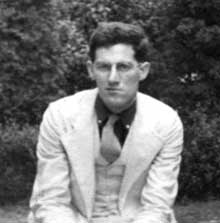Philip Worthington Foster was born a century ago today, June 1st, 1910, at the family home at 423 Fourth Avenue in Newark, New Jersey. He was the fifth surviving child and third surviving son of Harry Walter and Harriet Smith Edwards Foster. He moved with the family to Morristown, N.J., when his father purchased a hardware store there. He was educated at The Peck School, graduated from Morristown High School and attended Williams College. He later studied at the New York Institute of Photography.
He married Gertrude Marguerite “Bunny” Bates on December 26th, 1938, in Mendham, New Jersey. With his wife he established and operated the Laurel Hill Herb Farm in New Jersey. The farm, which comprised over 300 species of herbs, was a Mecca for horticulturalists throughout the world. It became a reliable source of herb seeds when they were difficult to obtain elsewhere. During World War II he was a partner in a small woodworking shop, under contract to Bell Telephone Laboratories for test models of radar components.
A personification of Yankee ingenuity, he could fix most any inanimate object, or contrive new gadgets for most any task. While spending summers in Litchfield County, Connecticut, as a boy, he fell in love with that area, and always intended to settle there. He built a cabin at Goshen during the 1930s, but at war’s end he and Bunny moved the herb business to Falls Village, Connecticut, just down the hill from Goshen. He became, in effect, a naturalized Yankee, or, as his son called him, a “Yankee by choice.”
His first child, Christopher Goodwin, always known as “Kit,” was born September 9th, 1944, in Morristown. A daughter, Margaret Rosemary, always called “Rosemary,” was born at Sharon, Connecticut, on December 20th, 1946.
The following year Bunny and Phil started a magazine about herbs, the American Herb Grower, published monthly and later quarterly as The Herb Grower until 1986. He served as publisher and printer of the magazine, his wife as editor and principal writer. His horticultural photography was often featured in the magazine, and was also used in two books authored by his wife.
He also started a printing business, the Laurel Hill Press, one of the first photo-offset printing shops in the region. He made or adapted much of the equipment needed for the business, including sophisticated cameras for the offset work and collating machines for the magazine. In addition to printing The Herb Grower and serving the printing needs of the surrounding community, Laurel Hill Press published a number of facsimile editions of historic herbals and other rare horticultural books. These included John Evelyn’s Kalendarium Hortense and The English Vineyard Vindicated by John Rose, gardener to Charles II.
He was elected a Fellow of the Linnean Society of London in 1968, the noted botanical and zoological institution. Named for Carl Linnaeus, the founder of the modern system of classification for living things, the Linnean Society was established in 1788 by Sir James Edward Smith, a collateral ancestor.
Active in Scouting as a boy, he attained the rank of Eagle Scout with gold and silver palms, earning 42 merit badges. He returned to Scouting as an adult, serving as Neighborhood Commissioner for the former Tunxis Council, Boy Scouts of America, in northwest Connecticut and later as Cubmaster of Pack 16, Scoutmaster of Troop 16 and adviser to Air Explorer Squadron 16, all of Falls Village. He received the Silver Beaver Award, the highest honor for Scouters, from Tunxis Council in 1958.
He became licensed as an amateur radio operator in 1957. Combining his new hobby with a life-long interest in observing and forecasting weather, he helped organize the New England Weather Net, a daily on-air meeting of “ham” operators in the region, in the late fifties. The Weather Net later became associated with long-time weathercaster Don Kent of WBZ in Boston, furnishing the station on-the-spot weather reports from throughout New England.
He served his community as a member of the Board of Assessors in Falls Village for 25 years. He was also a member of the Canaan Exchange Club and Christ Church, Canaan, where he served on the Vestry.
At the age of 71, with the help of his son-in-law Jay Louden, he built a small retirement home on a subdivided part of the Falls Village property. During the mid-1980s, he and Bunny found The Herb Grower an increasing burden, and they slowly let it become dormant. The occupied themselves with planting new gardens at their new home, but never completely disengaged from the old property next door. After Bunny suffered the onset of Alzheimer’s disease in the early 1990s, Phil became devoted to her care. At the age of 86, he suffered a massive stroke, but recovered to join her at a nursing home, where they spent the remainder of their married life together. She died on November 29, 1997, less than a month before their 59th wedding anniversary.
Phil then moved to a nursing home nearer to his children. He died Sunday, May 23rd, 1999, at Fairview, the Odd Fellows Home of Connecticut, in Groton, Connecticut.
Tuesday, June 1, 2010
Subscribe to:
Post Comments (Atom)





No comments:
Post a Comment